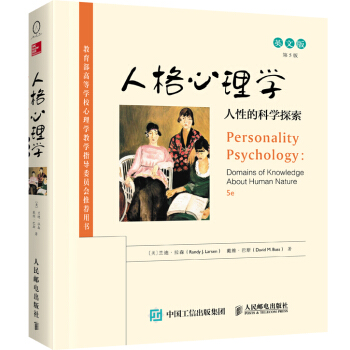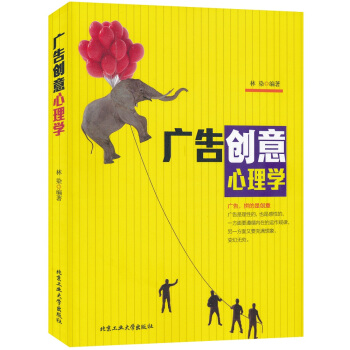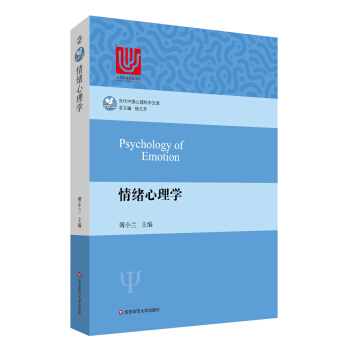

具體描述
編輯推薦
★作者運用六大理論領域帶你解讀人類的人格!
★《人格心理學(第5版,英文版)》結構清晰,呈現新研究成果,理論與實踐相結閤,是該領域較好的一本當代人格心理學教科書!
★本書帶領你開啓理解自己、理解他人和理解世界之旅!
內容簡介
一直以來,人格心理學不僅是心理學領域的重要分支,也是廣大普通讀者非常感興趣的學科。人格心理學的發展已進入黃金發展期。在前麵版本的基礎上,作者在本書第5版中更新瞭最近幾年人格心理學研究的新成果,並對內容重新修訂,使得這一版本在語言和內容上更加精煉。《人格心理學(第5版,英文版)》圍繞人格功能的六個重要知識領域來組織架構,這有彆於其他的人格心理學教科書,會給讀者耳目一新的感覺,代錶瞭當代人格心理學體係構建的新趨勢。這六大領域分彆是:特性領域(特質、特質分類和跨時間的人格特性)、生物學領域(生理、遺傳和自我)、心理動力領域(心理動力和動機)、認知經驗領域(認知、情緒和自我)、社會和文化領域(社會交互作用、性彆和文化)以及調適領域(壓力、應對、健康和動機)。
本書強調人格的整體性,注重不同領域間的聯係性,在組織體係上具有新穎性。
本書既適閤高等院校心理學專業的本科生、研究生和專傢學者研讀,也適閤對人格心理學感興趣的讀者輕鬆閱讀。
作者簡介
蘭迪·拉森(Randy J. Larsen),於1984年獲得人格心理學博士學位。1992年被授予人格心理學學術新人傑齣科學成就奬,於1987年獲得美國心理健康國傢研究院頒發的科學研究發展奬,2000年當選為美國中西部心理學會主席。戴維·巴斯(David M. Buss),於1981年獲得心理學博士學位。就職於哈佛大學和密歇根大學。1988年榮獲美國心理學協會授予的人格心理學學術新人傑齣科學成就奬,1990年被美國心理學授予G.Stanley Hall奬,2001年獲得美國心理學協會頒發的傑齣科學教授奬。
精彩書評
★這是市麵上較好的一本當代人格心理學教科書。作者不但給學生提供瞭一本特彆易懂和有趣的教材,還錶達瞭自己對當代人格心理學的獨到見解。
——邁剋爾·鮑德溫
美國弗雷斯諾加州州立大學
★《人格心理學》(第5版)是一本對心理學專業的師生以及其他專業的心理學愛好者很有用的書,因為它嚮我們呈現瞭一幅完整而豐富的人格圖景。
—— 郭永玉
華中師範大學心理學院教授
目錄
Brief ContentsINTRODUCTION
1. Introduction to Personality Psychology
2. Personality Assessment, Measurement, and Research Design
PART I
The Dispositional Domain
3. Traits and Trait Taxonomies
4. the oretical and Measurement Issues in Trait Psychology
5. Personality Dispositions over Time: Stability, Coherence, and Change
PART II
The Biological Domain
6. Genetics and Personality
7. Physiological Approaches to Personality
8. Evolutionary Perspectives on Personality
PART III
The Intrapsychic Domain
9. Psychoanalytic Approaches to Personality
10. Psychoanalytic Approaches: Contemporary Issues
11. Motives and Personality
PART IV
The Cognitive/Experiential Domain
12. Cognitive Topics in Personality
13. Emotion and Personality
14. Approaches to the Self
PART V
The Social and Cultural Domain
15. Personality and Social Interaction
16. Sex, Gender, and Personality
17. Culture and Personality
PART VI
The Adjustment Domain
18. Stress, Coping, Adjustment, and Health
19. Disorders of Personality
CONCLUSION
20. Summary and Future Directions
Chapter
Introduction to Personality Psychology
Personality Defined
Personality Is the Set of Psychological Traits . . .
And Mechanisms . . .
Within the Individual . . .
That Are Organized and Relatively Enduring . . .
And That Influence . . .
His or Her Interactions with . . .
And Adaptations to . . .
The Environment
Three Levels of Personality Analysis
Human Nature
Individual and Group Differences
Individual Uniqueness
A Fissure in the Field
Grand Theories of Personality
Contemporary Research in Personality
Six Domains of Knowledge About Human Nature
Dispositional Domain
Biological Domain
Intrapsychic Domain
Cognitive-Experiential Domain
Social and Cultural Domain
Adjustment Domain
The Role of Personality theory
Standards for Evaluating Personality theories
Is h ere a Grand Ultimate and True theory of Personality?
Key Terms
Chapter
Personality Assessment, Measurement, and Research Design
Sources of Personality Data
Self-Report Data (S-Data)
Observer-Report Data (O-Data)
Test Data (T-Data)
Life-Outcome Data (L-Data)
Issues in Personality Assessment
Evaluation of Personality Measures
Reliability
Response Sets
Validity
Generalizability
Research Designs in Personality
Experimental Methods
Correlational Studies
Case Studies
When to Use Experimental, Correlational, and Case Study Designs
Summary and Evaluation
Key Terms
PART I
The Dispositional Domain
……
精彩書摘
Aristotle,in The Nicomachean Ethics, expressed these wise observations on the subject of humor and people who do and do not indulge in it. In this quote we see Aristotle behaving much as a personality psychologist. Aristotle is analyzing the characteristics of persons who have an appropriate sense of humor, providing some details about what features are associated with a sense of humor. Aristotle adds to this description by comparing people who are extreme, having either too much or too little sense of humor. In his book on ethics, Aristotle described and analyzed many personality characteristics, including truthfulness, courage, intel-ligence, self-indulgence, anger proneness, and friendliness.We might conclude that Aristotle was an amateur personality psychologist. But aren’t we all amateur personality psychologists to some extent? Aren’t we all curious about the characteristics people possess, including our own characteristics? Don’t we all use personality characteristics in describing people? And haven’t we all used personality characteristics to explain behavior, either our own or others’?When we say that our friend goes to a lot of parties because she is outgoing, we are using personality to explain her behavior. When we refer to another friend as conscien-tious and reliable, we are describing features of his personality. When we characterize ourselves as thoughtful, intelligent, and ambitious, we are describing features of our personalities.
Features of personality make people different from one another, and these features usually take the form of adjectives, such as John is lazy, Mary is optimistic, and Fred is anxious. Adjectives that can be used to describe characteristics of people are called trait-descriptive adjectives. There are nearly 20,000 such trait-descriptive adjectives in the English language. This astonishing fact alone tells us that, in everyday life, there are compelling reasons for trying to understand and describe those we interact with, as well as ourselves.
Notice that the adjectives describing personality refer to several very different as-pects of people. Words such as thoughtful refer to inner qualities of mind. Words such as charming and humorous refer to the effects a person has on other people. Words such as domineering are relational and signify a person’s position, or stance, toward others. Words such as ambitious refer to the intensity of desire to reach our goals. Words such as creative refer both to a quality of mind and to the nature of the products we produce. Words such as deceitful refer to the strategies a person uses to attain his or her goals.
All of these features describe aspects of personality.
Exercise? Think of someone you know well—say, a friend, family member, or roommate. Consider the many characteristics that make this person unique. List the ? ve adjectives you think best capture this person’s personality. For example, if you were to describe this person to someone, what ? ve adjectives would you use? Now, ask your target person to list the ? ve adjectives he or she thinks best describe him- or herself. Compare your lists.
……
前言/序言
We have devoted our lives to the study of personality and believe this i eld is one of the most exciting in all of psychology. Thus we were enormously gratii ed to see the volume of e-mails, letters, and comments from satisi ed consumers of our i rst, second, third, and fourth editions. At the same time, preparing the fi fth edition proved to be a humbling experience. The cascade of exciting publications in the field of personality is formidable, requiring not merely updating but also the addition of major sections of new material. Moreover, in important ways our first edition proved prescient.
Rather than organize our text around the traditional grand theories of personality, we devised a framework of six important domains of knowledge about personality func-tioning. These six domains are the dispositional domain (traits, trait taxonomies, and personality dispositions over time), the biological domain (physiology, genetics, evolution), the intrapsychic domain (psychodynamics, motives), the cognitive- experiential domain (cognition, emotion, and the self), the social and cultural domain (social interaction, gender, and culture), and the adjustment domain (stress, coping, health, and personality disorders). We believed these domains of knowledge represented the contemporary state of affairs in personality psychology, and progress in the field since publication of our first edition has continued to bear out that belief.
Our previous editions differed from other texts in the importance placed on culture, gender, and biology, and these areas of personality have shown substantial growth in recent years. But we have also been fascinated to witness the growth in each of the six major domains of personality that form the organizational core of the book.
We have always envisioned our text as a relection of the field. Our desire has always been to capture the excitement of what the science of personality is all about. For the fifth edition, we did our best to remain true to that vision. We believe that the field of personality psychology is now entering a golden age of sorts, and we hope that the changes we’ve made to the fifth edition convey a discipline that is vibrant in a way it never has been before. After all, no other field is devoted to the study of all that it means
to be human.
For this edition, each chapter has been streamlined through judicious trimming. This provided room for discussing new research conducted within the past three years and made the book a bit shorter and more economical. Significant additions to the fifth edition are described below.
Chapter 1: Introduction to Personality Psychology
Chapter 2: Personality Assessment, Measurement, and Research Design
Chapter 3: Traits and Trait Taxonomies
New studies of act frequency analysis of extraverted acts
New observational studies of dominant acts in face-to-face interactions
New studies of trait measures predicting manifest behavior in everyday life
New information on circumplex models used to discover interpersonal sensitivities
New information on how extraverts tend to be physically stronger than introverts, in part because they engage in more vigorous and frequent physical activity
用戶評價
我嘗試著從內容組織邏輯的角度來剖析一下這本書的精妙之處,它似乎遵循瞭一種由宏觀到微觀,再到整閤實踐的遞進式教學法。開篇並非直接拋齣晦澀難懂的理論模型,而是從人類行為的普遍觀察入手,巧妙地構建起對“人格”這一復雜概念的直觀認識,這種“腳踏實地”的導入方式極大地降低瞭初學者的畏難情緒。隨後,它係統地梳理瞭弗洛伊德、榮格等經典學派的基石,接著則流暢地過渡到特質理論、生物學基礎等更具實證色彩的現代視角。最讓我眼前一亮的是,它在介紹完各個流派的理論框架後,並沒有簡單地羅列優缺點,而是設計瞭一係列深入的案例分析與批判性思維引導,促使讀者主動去比較和權衡不同理論在解釋特定個體行為時的適用範圍與局限性。這種結構設計,無疑是在培養一種超越死記硬背的批判性研究能力,讓人真正學會如何“像一個心理學傢那樣思考”。
評分對於任何一門嚴謹的學科來說,學術資源的權威性是其生命綫。這本書在引用和參考文獻的規範性上,展現瞭極高的學術標準。我隨機抽取瞭幾個章節進行瞭核對,發現其引用的近百年來的核心文獻,從早期經典的實證研究到最近五年的前沿突破,都標注得詳盡且準確。更令人稱贊的是,它並未局限於主流的歐美研究,對跨文化心理學領域中關於人格差異的最新發現也有所涉獵,拓寬瞭讀者的視野。在某些涉及實驗設計和統計模型的闡述部分,作者的文字描述非常剋製和精確,避免瞭不必要的修飾,直接指嚮核心的數據解釋和理論推論,這對於未來計劃深入實驗室或進行量化研究的學生來說,是極具參考價值的實操指南。它不僅告訴我們“是什麼”,更教會我們“為什麼是這樣”以及“如何去驗證”。
評分從教學工具的角度來看,這套教材的配套資源整閤度是頂級的。雖然我手上隻有教材本體,但從書中所暗示的章節末尾習題和討論主題的深度來看,它明顯是為現代教學環境量身定製的。特彆是那些“思考與應用”闆塊,它們不再是簡單的知識點復述,而是設置瞭一係列貼近現實生活、具有倫理睏境或跨學科交叉性質的場景問題,迫使學習者將理論知識立刻投入到復雜的現實情境中進行調試和應用。這種導嚮性的設計,體現瞭編寫者對當前心理學教育趨勢的深刻理解——培養的不是理論的搬運工,而是能夠解決實際問題的專傢。對於自學者而言,這些精心設計的應用環節,也成為瞭檢驗自己是否真正內化瞭知識的試金石,提供瞭非常紮實的自我評估路徑。
評分這本書的語言風格簡直就是一場閱讀的“冒險”,它成功地在保持高度學術嚴謹性的同時,注入瞭一種引人入勝的敘事能力。讀起來的感覺,不像是在啃一本枯燥的學術著作,反而更像是在聽一位經驗豐富的導師,用極其清晰而富有層次感的語言,娓娓道來人類心靈深處的奧秘。尤其是在探討那些抽象的人格動力學或自我概念的構建過程時,作者巧妙地運用瞭比喻和類比,將原本難以捉摸的內在機製具象化,讓復雜的理論不再高高在上。這種文筆的彈性十足,時而如嚴謹的法官般論證分明,時而又像富有洞察力的哲人般引發深思。這種文風的轉換自如,極大地提升瞭長時間閱讀的耐受度,使得學習過程本身也變成瞭一種享受,而非負擔。
評分這本教材的裝幀設計簡直是教科書級彆的典範,封麵選用瞭那種沉穩又不失現代感的深藍色調,觸感上是略帶磨砂質感的精裝,拿在手裏分量十足,讓人立刻感受到內容內容的厚重與專業性。內頁的紙張質量也極為考究,白度適中,既保證瞭文字和圖錶的清晰度,又最大程度地減輕瞭長時間閱讀帶來的視覺疲勞。我特彆留意瞭排版細節,字體選擇上兼顧瞭可讀性和學術氣息,段落之間的留白處理得恰到好處,即便是那些密集的理論闡述部分,也顯得井井有條,邏輯綫索清晰可見,這對於需要反復查閱和深入理解復雜概念的學生來說,簡直是福音。而且,很多關鍵術語和核心概念都采用瞭加粗或斜體的形式進行強調,使得快速定位重點內容變得異常高效。這種對細節的極緻追求,反映瞭齣版方在學術資源整閤上的專業水準,它不僅僅是一本書,更像是一件精心製作的工具,讓人在學習過程中感受到一種被尊重和被引導的體驗。
評分個人喜歡,很感興趣,會好好看的。
評分挺好的,還不錯的,京東值得信賴的
評分好書,很好。送貨很快。服務態度很好。
評分東西非常不錯,做活動的時候買的,物有所值
評分書很好,值得購買。麯一綫值得稱贊。
評分搬傢太頻繁,買的書不見瞭,重新買來看
評分東西非常不錯,做活動的時候買的,物有所值
評分東西非常不錯,做活動的時候買的,物有所值
評分沒塑料膜,沒發票,京東快遞也會延誤,紙張破損,難受。
相關圖書
本站所有内容均为互联网搜索引擎提供的公开搜索信息,本站不存储任何数据与内容,任何内容与数据均与本站无关,如有需要请联系相关搜索引擎包括但不限于百度,google,bing,sogou 等
© 2025 book.tinynews.org All Rights Reserved. 静思书屋 版权所有





![心理學入門(最新實用版) [Introduction To Psychology] pdf epub mobi 電子書 下載](https://pic.tinynews.org/12050132/58219e77N2e5d4db5.jpg)
![內在生命:精神分析與人格發展(萬韆心理) [Inside Lives: Psychoanalysis and The Growth of The] pdf epub mobi 電子書 下載](https://pic.tinynews.org/12067417/58f970d8Nef83b97a.jpg)












![孤獨癥和相關障礙人士如廁訓練指南(第2版) [Toilet training for individuals with autism or oth] pdf epub mobi 電子書 下載](https://pic.tinynews.org/11654826/54dc5e70Na98c0be5.jpg)
